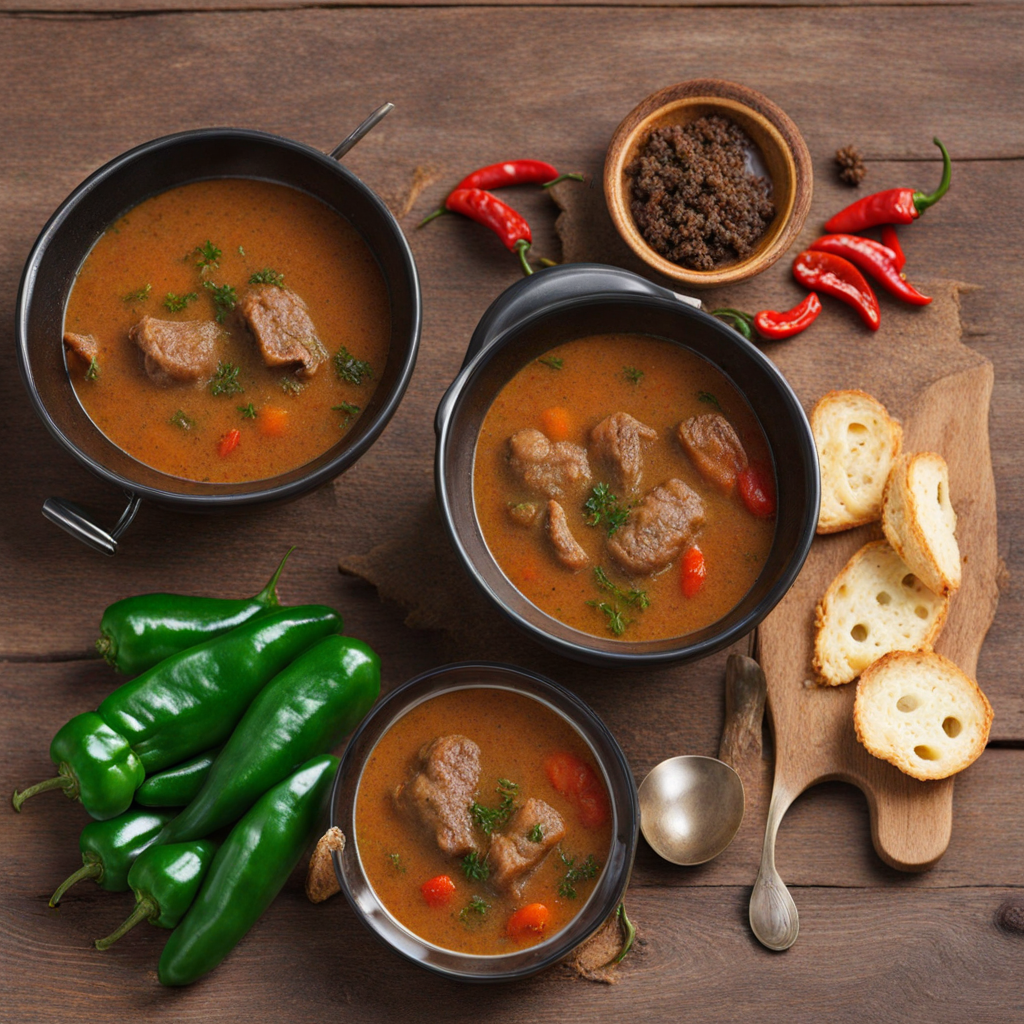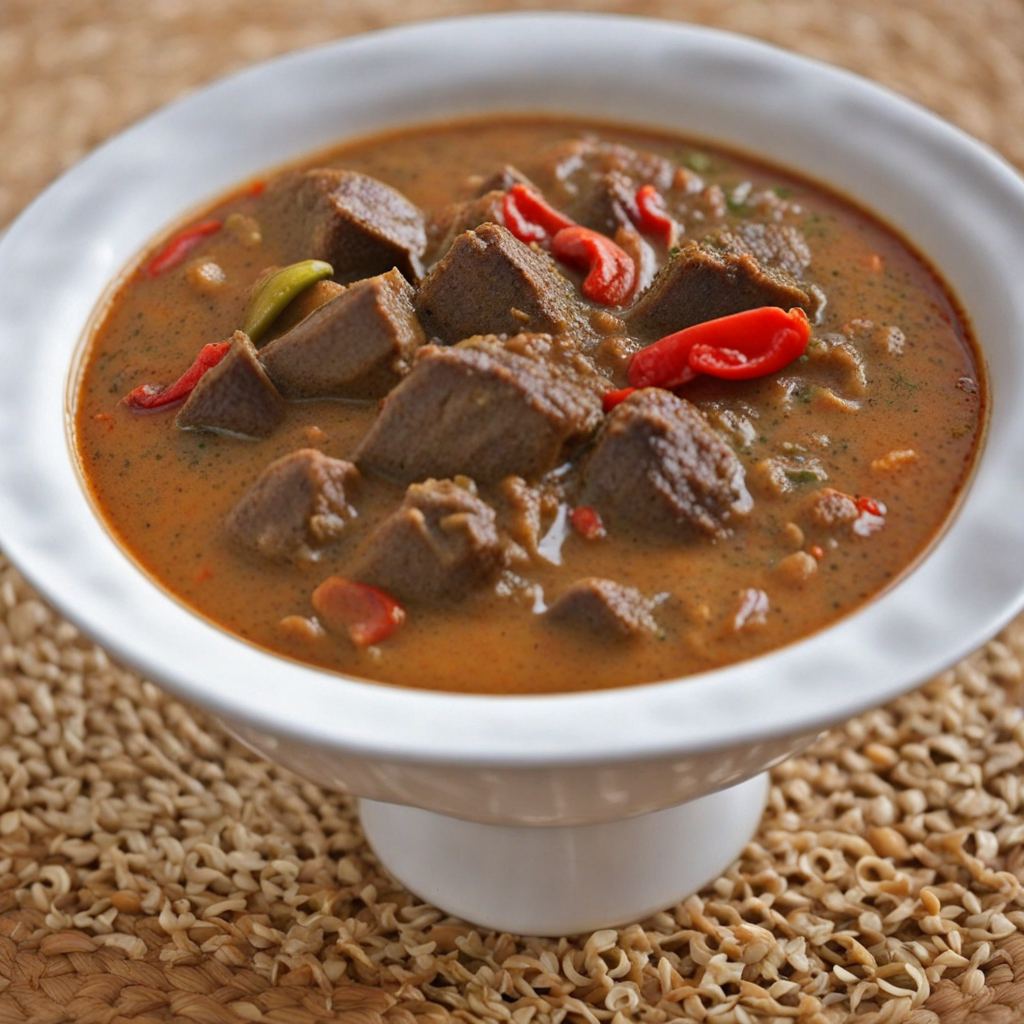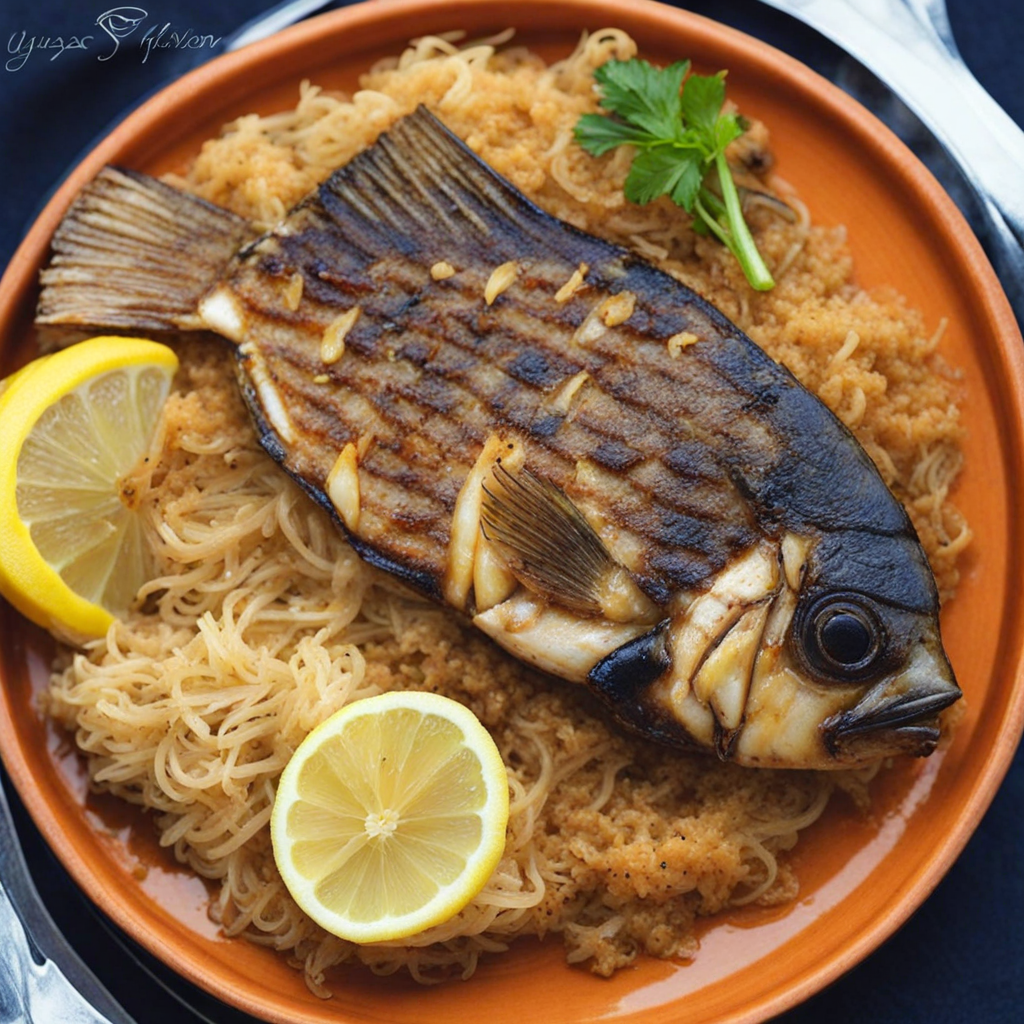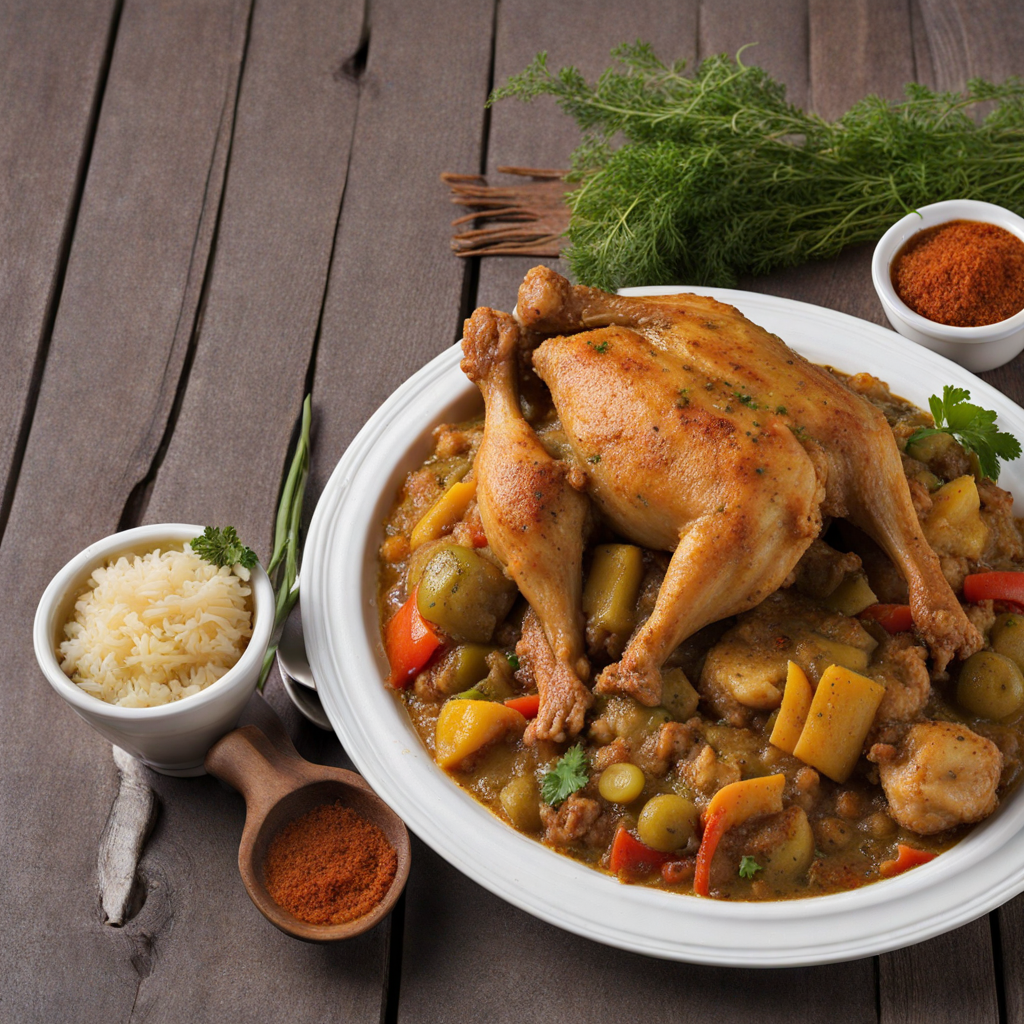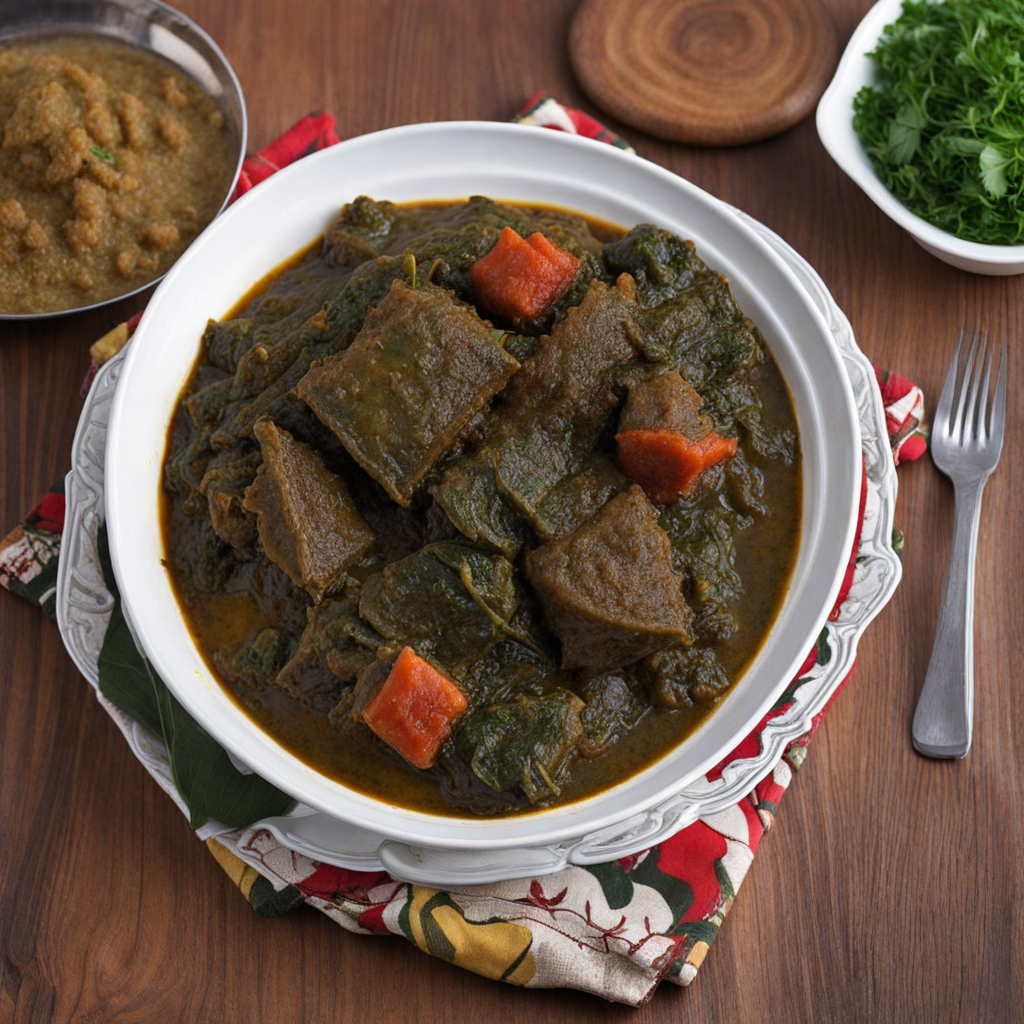Pepper Soup
Pepper Soup is a vibrant and aromatic dish originating from Gabon that embodies the essence of West African cuisine. This spicy broth is typically made with a variety of meats or fish, which are simmered to perfection in a rich, flavorful stock. The hallmark of Pepper Soup lies in its complex blend of spices, including pepper, ginger, garlic, and a variety of local herbs that infuse the dish with a warm and inviting heat. The soup is often served piping hot, making it a comforting option for both casual meals and special occasions. The textures and flavors in Pepper Soup are incredibly dynamic. As you take your first sip, you're greeted by the bold and piquant flavors that dance on your palate, highlighting the freshness of the ingredients. The meat or fish used in the soup is tender and succulent, soaking up the spicy broth, while the addition of vegetables like onions, tomatoes, or leafy greens adds a refreshing contrast. This dish is not just about heat; it’s a harmonious balance of flavors that captivates the senses and encourages a communal dining experience. Traditionally enjoyed as an appetizer or a light meal, Pepper Soup is often paired with side dishes such as rice, yam, or plantains, which help to mellow the spiciness and provide a satisfying accompaniment. It is a dish that showcases the cultural richness of Gabon, inviting food lovers to explore the bold flavors and aromas of West African cooking. Whether enjoyed at a family gathering or a local eatery, Pepper Soup promises an unforgettable culinary adventure that highlights the warmth and hospitality of Gabonese culture.
How It Became This Dish
Soupe au Poivre: A Culinary Gem of Gabon #### Origins Soupe au Poivre, or "Pepper Soup," is a traditional dish that hails from Gabon, a country located on the west coast of Central Africa. The roots of this dish can be traced back to the indigenous populations of the region, who utilized local ingredients and cooking methods that have been passed down through generations. Gabon is blessed with a diverse ecosystem, offering a rich array of flora and fauna, which significantly influences its culinary practices. The use of pepper, particularly in the form of both black and white varieties, is integral to the dish, tying it to the region's agricultural practices and trade. The word "soupe" embodies the essence of comfort food in Gabonese culture. It serves not only as a meal but also as a communal experience, often enjoyed during social gatherings and family occasions. The practice of sharing a bowl of soup reflects the values of community and togetherness, which are deeply embedded in the Gabonese way of life. #### Ingredients and Preparation The core ingredients of Soupe au Poivre typically include a combination of meats—often chicken, fish, or game—along with various vegetables, spices, and, of course, pepper. The use of peppercorns, both whole and ground, adds a unique depth of flavor to the dish, while other spices like ginger, garlic, and onions enhance its aromatic profile. The dish may also incorporate local vegetables such as cassava, plantains, or leafy greens, which contribute to its nutritional value. Preparation of Soupe au Poivre is an art form, often involving slow cooking to allow the flavors to meld and develop fully. Traditionally, the dish is prepared in a large pot over an open flame, with the ingredients being added in stages to achieve the perfect balance of textures and tastes. The process is a communal affair, often involving family members or friends gathering to chop, season, and stir, fostering a sense of camaraderie and shared cultural heritage. #### Cultural Significance Soupe au Poivre holds a significant place in Gabonese culture, serving as a symbol of hospitality and generosity. It is often prepared for guests as a gesture of welcome and respect, showcasing the host's culinary skills and their connection to local traditions. The dish is commonly served during festive occasions such as weddings, birthdays, and religious ceremonies, highlighting its role in marking important life events. In many Gabonese communities, soup is considered a staple food, providing sustenance and warmth, especially during the cooler months. The act of sharing a bowl of soup reinforces social bonds and community ties, illustrating the importance of food in fostering relationships and maintaining cultural identity. Additionally, Soupe au Poivre is often associated with healing properties, as the spices and herbs used are believed to have medicinal benefits, making it a popular choice for those recovering from illness or seeking comfort. #### Development Over Time As Gabon has evolved over the years, so too has Soupe au Poivre. The dish has adapted to incorporate new ingredients brought through trade and globalization, resulting in variations that reflect the country's changing demographics and cultural influences. For instance, the introduction of new spices, such as chili peppers or even saffron, has led to innovative recipes that cater to evolving palates. The global culinary scene has also played a role in the dish's development. With increased travel and cultural exchanges, Gabonese cuisine, including Soupe au Poivre, has gained recognition beyond its borders. Chefs and food enthusiasts around the world have begun to explore and celebrate African cuisines, leading to a revival of interest in traditional dishes and their significance. Moreover, contemporary chefs in Gabon are reinterpreting Soupe au Poivre, experimenting with presentation and fusion techniques while still honoring the dish's traditional roots. This has resulted in a new wave of culinary creativity that appeals to both local and international diners. By incorporating modern cooking methods or plating styles, they are keeping the spirit of the dish alive while ensuring its relevance in today's culinary landscape. #### Conclusion Soupe au Poivre is more than just a dish; it represents the heart and soul of Gabonese culture. It embodies a rich history that reflects the land's resources, the communal spirit of its people, and the evolving nature of food in a globalized world. As Gabon continues to grow and change, so too will Soupe au Poivre, ensuring that this delectable soup remains a cherished part of Gabonese heritage for generations to come. In a world where culinary traditions are increasingly at risk of being diluted, Soupe au Poivre stands as a testament to the resilience of Gabon's cultural identity. Each bowl tells a story of the land, its people, and their enduring connection to the past, while also embracing the future with open arms. This dish, rich in flavor and history, continues to bring people together, serving as a reminder that food is not just about sustenance—it is about community, culture, and the shared experiences that bind us all.
You may like
Discover local flavors from Gabon


